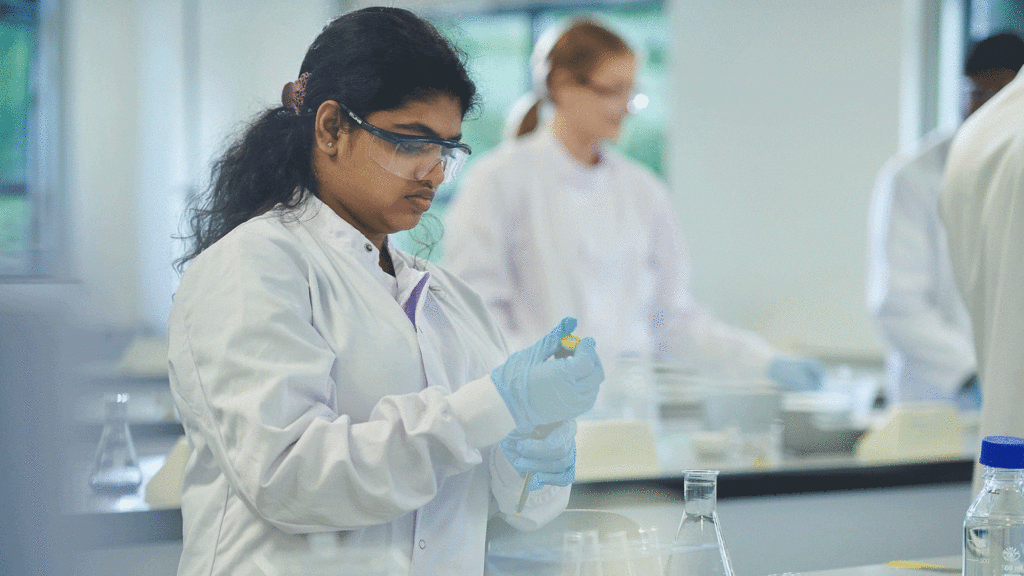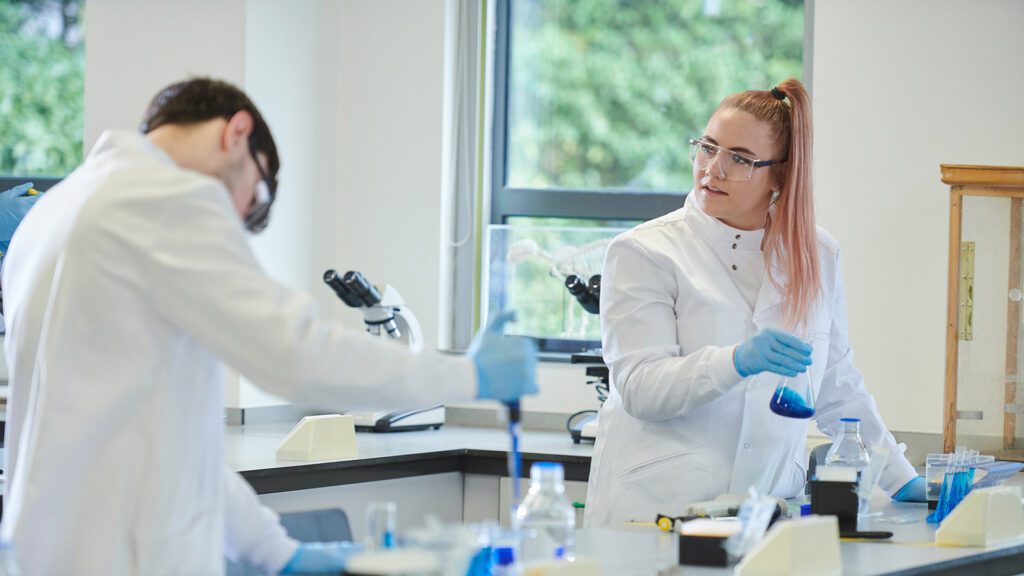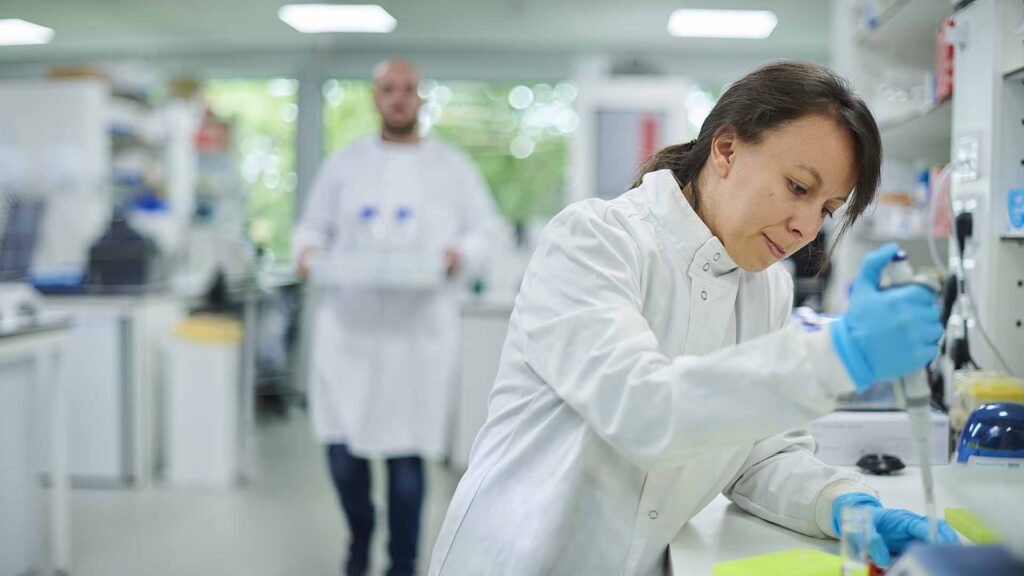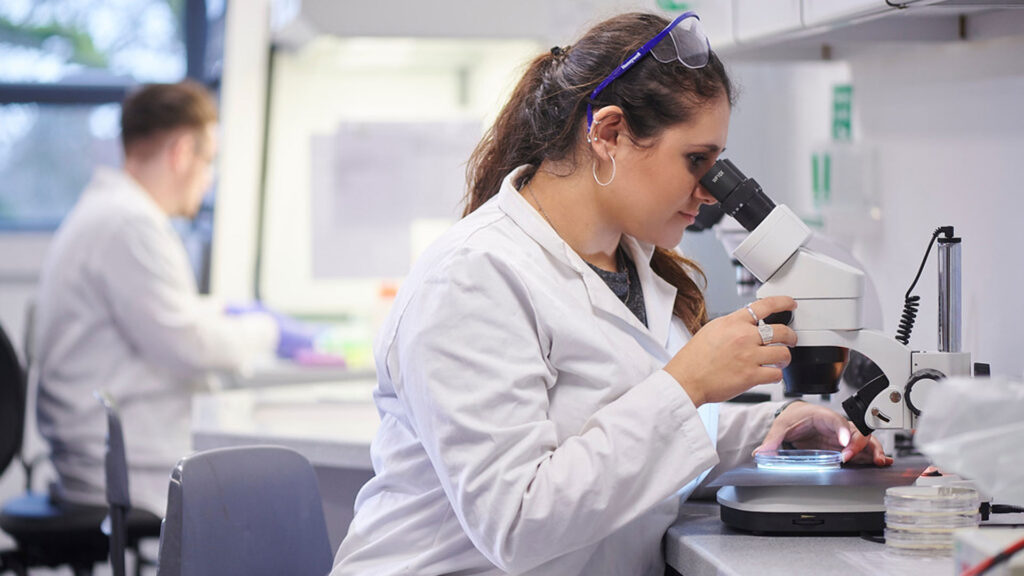Chemistry MChem (Hons)
UCAS code: F101
Join an industry that is an essential part of our everyday lives. Graduate as a highly sought after professional. Our MChem (Hons) Chemistry degree combines teaching with extensive practical work as you discover areas such as molecules, materials, organic and inorganic synthesis, along with a range of analytical techniques.
Subject to validation
Overview
| Course length: | 4 years full-time 5-8 years part-time |
|---|---|
| Start dates: | September 2025 |
| Location: | Edge Hill University |
| Example offers: | BBC-BBB (A Level) or DMM (BTEC) View full entry criteria |
| Subject(s): | Chemistry |
| Faculty: | Arts and Sciences |
| Department: | Biology |

Are you fascinated by how chemical processes are regulated? Do you want to develop your skills as a research scientist? Our four year integrated masters degree allows you to do this and more as you learn from a team of expert tutors and technical staff.
Develop your practical knowledge in our state-of-the-art laboratories, giving you a strong grounding for future employment.
Combine the fundamental principles of chemistry with specific areas of interest to you in our MChem (Hons) Chemistry degree. Optional final year modules enable you to tailor the degree to develop a deeper knowledge of a specialist area of chemistry.
Enter an industry in which chemistry graduates are highly sought after upon successful completion of our MChem (Hons) Chemistry degree. Pharmaceutical companies, chemical engineering, food technology or the health industry are just some of the career options available.
Course features
-
Studying abroad option available
-
International students can apply
-
Sandwich year option available
What you'll study
During Year 1 of your chemistry degree we concentrate on the fundamentals of chemistry, focusing on four areas – organic, inorganic, physical and analytical. Modules will also explore other areas that are closely related to chemistry including maths and the other sciences. You’ll also begin developing your practical skills in the labs which is the key focus and essential for professional chemists in many employment areas.
In Year 2 you will gain a deeper understanding of chemistry as you’re introduced to more complex chemistry. Using modern materials and analytical chemistry, you’ll also be introduced to more powerful techniques such as coupled chromatography. The importance given to laboratory skills continues, with two lab sessions per week throughout the year.
Year 3 is focused on advancing your analytical chemistry skills. Breadth to your studies will come through modules in Modern Materials, Modern Synthesis and Natural Products Chemistry.
In Year 4, you will undertake a significant piece of individual research in the form of an MChem Research Project supported by a diverse team of researchers. This will enable you to apply the range of planning, execution and reporting skills developed in first and second year.
Where your course includes optional modules, these are to provide an element of choice within the course curriculum. The availability of optional modules may vary from year to year and will be subject to minimum student numbers being achieved. This means that the availability of specific optional modules cannot be guaranteed. Optional module selection may also be affected by timetabling requirements. Some restrictions on optional module choice or combinations of optional modules may apply.
How you'll study
You will study via a combination of face-to-face lectures, practical sessions and tutorials, and will typically be in the department most days of the week. In addition to the taught sessions, you will be expected to hone your skills using the excellent departmental facilities in your own time.
How you'll be assessed
Modules are assessed by a mixture of coursework, practical elements and examinations tailored to suit the subject area of each module. A wide range of coursework is employed, including practical write-ups, essays, laboratory logbooks and even biochemistry animations.
Who will be teaching you
Our experienced and knowledgeable staff take pride in the quality of their teaching. Their research activity means they keep up to date with current developments in their area of interest and pass knowledge onto their students. Visiting speakers also assist in the delivery of the programme, often presenting unique or novel aspects of subjects. The department is friendly and approachable and of a size that enables us to know our students personally.
Entry criteria
Entry requirements
112-120 UCAS Tariff points, including A level Chemistry at Grade B or above, or equivalent. You will also need GCSE Mathematics and GCSE English Language at Grade C or Grade 4, or equivalent.
Example offers
| Qualification | Requirement |
|---|---|
| A Level | BBC-BBB. |
| BTEC Extended Diploma (or combination of BTEC QCF qualifications) | Distinction, Merit, Merit (DMM). |
| T Level | Overall grade of Merit. |
| International Baccalaureate (IB) | We are happy to accept IB qualifications which achieve the required number of UCAS Tariff points. |
| Access to Higher Education Diploma | 45 credits at Level 3, for example 15 credits at Distinction and 30 credits at Merit or 24 credits at Distinction and 21 credits at Merit. The required total can be attained from various credit combinations. |
Please note, the above examples may differ from actual offers made. A combination of A Level and BTEC awards may also be accepted.
If you have a minimum of two A Levels (or equivalent), there is no maximum number of qualifications that we will accept UCAS points from. This includes additional qualifications such as Extended Project Qualification (EPQ), AS Levels that haven't been continued to A Level, and General Studies AS or A Level awards.
English language requirements
International students require IELTS 6.0, with a score no lower than 5.5 in each individual component, or an equivalent English language qualification.
If your current level of English is half a band, one band, or one-and-a-half bands lower, either overall or in one or two elements, you may want to consider our Pre-Sessional English course.
How to apply
Apply full-time
Read our guide to applying through UCAS to find out more about the application process.
International
Please see our international student pages for further information about how to apply as a prospective international student.
The link to apply as a part-time student will be added to this page when it is available.
Should you accept an offer of a place to study with us and formally enrol as a student, you will be subject to the provisions of the regulations, rules, codes, conditions and policies which apply to our students. These are available at www.edgehill.ac.uk/studentterms.
If you join a full time undergraduate degree at Edge Hill University, we will guarantee you the offer of a room in our halls of residence for the first year of your course.
Discover our accommodation
Facilities
MChem (Hons) Chemistry students have access to our BioSciences building that incorporates impressive, modern laboratories, offering exciting and highly relevant practical experience in some of the best equipped facilities in the country.

Where you'll study
BioSciences
Finance
Tuition fees
Course fees for the 2025/26 academic year are to be confirmed. This page will be updated with further information when it is available.
EU/EEA and Swiss students who have settled or pre-settled status under the EU Settlement Scheme, as well as Irish nationals, may be eligible for the UK tuition fee rate.
Financial support
Subject to eligibility, UK students joining this course can apply for a Tuition Fee Loan from the Government to cover the full cost of tuition fees. UK students enrolling on the course may also be eligible to apply for additional funding to help with living costs.
Please view the relevant Money Matters guide for comprehensive information about the financial support available to eligible UK students.
EU/EEA and Swiss students who have settled or pre-settled status under the EU Settlement Scheme may be eligible to apply for financial support. Irish nationals can ordinarily apply to Student Universal Support Ireland (SUSI). If you are an EU student who does not have settled or pre-settled status, or are an international student from a non-EU country, please see our international student finance pages.
Your future career
As an MChem Chemistry graduate, you will have the option to work in a variety of fields when you graduate. This includes pharmaceutical companies, chemical engineering, food technology or health-related industries. Chemists are viewed as articulate, logical, numerate and good communicators, so are highly sought after as managers or in education.
Or, you may also choose to extend your research further through an MRes degree.











